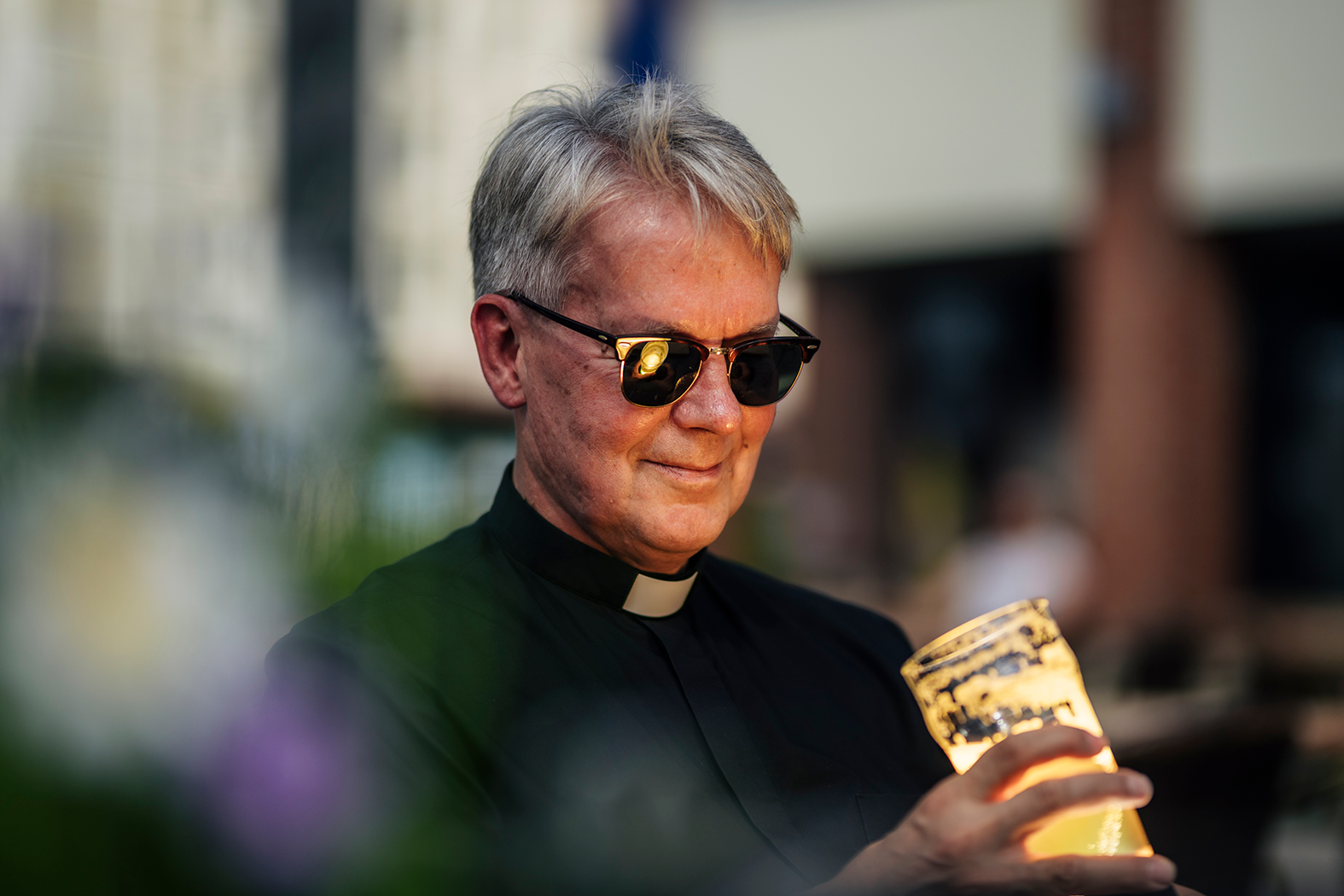“I won’t hammer you on the head with the bible” – Visiiri took the retiring campus pastor out for a beer
Original text: Maria Muilu
Pictures: Eino Ansio
Translation: Oskari Koski
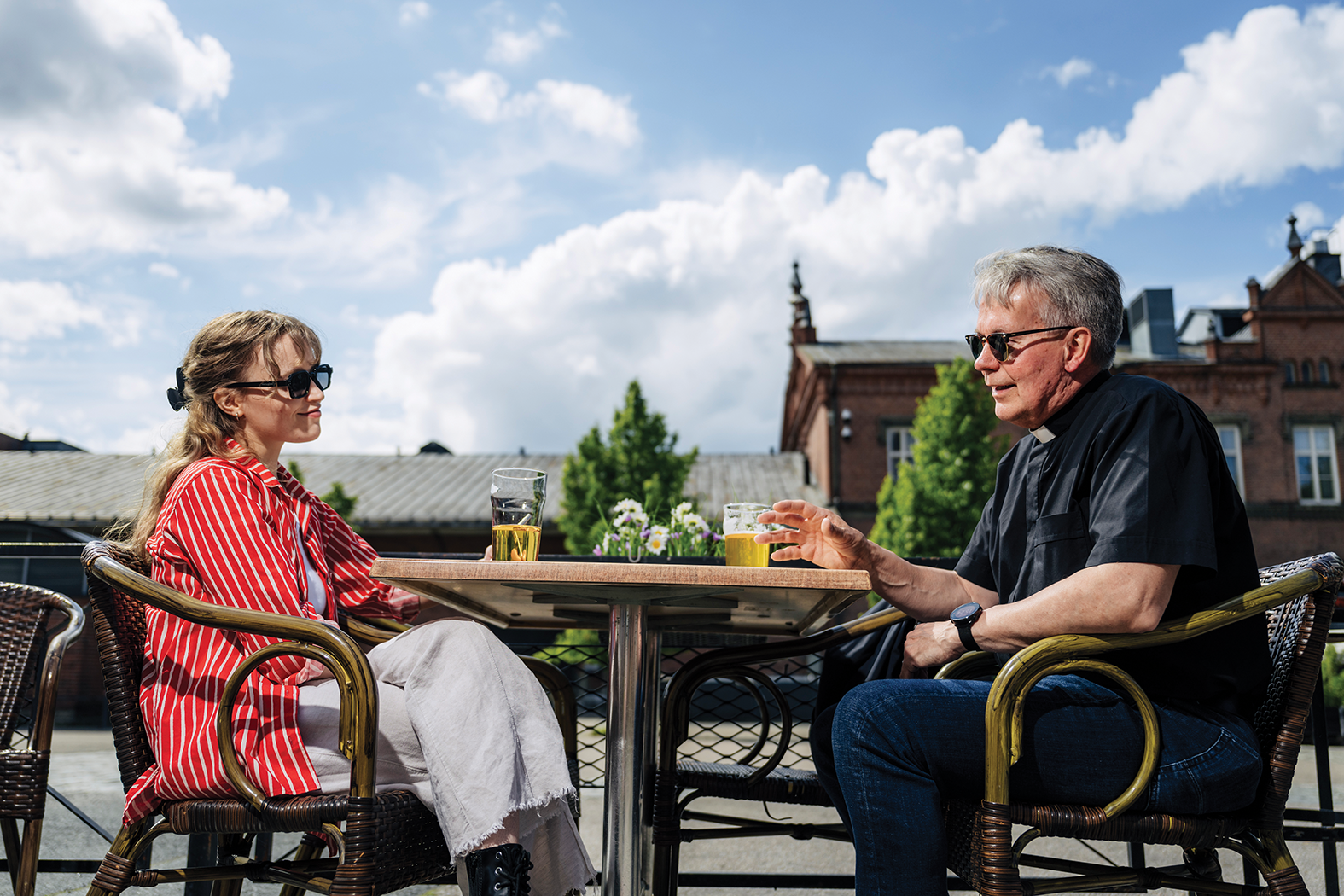
The reformer Martin Luther was famously fond of good beer and wine.
In some speeches connected to Luther, he says that the company of friends, good food and drink, and music were the best medicine to keep away depression and anxiety.
I’ve invited Risto Korhonen, the campus pastor from the Federation of Tampere Evangelical Lutheran Parishes, out for beers at bar Passion on a summer evening, to talk about God, the position of the church, students’ challenges and his looming retirement. Korhonen’s 28-year long career as the campus pastor of Tampere University is soon coming to an end.
Priesthood is associated with strict attitudes. Can a pastor drink bubbly drinks while in priestly uniform in a wedding or a christening ceremony? Is it appropriate for a priest to go out for drinks?
“If I recognise myself as someone who follows Luther, his thoughts are well suited for even the rowdiest of sitsi evenings and other student parties,” Korhonen says.
He thinks that it is up to each priest to find the best way for them to act.
“Since I’ve been able to be involved in the university community and students’ lives for such a long time, I’ve kept it as a mission shake up the message of the church and to update the preconceptions about church employees as stuck in time.”
His long work in the community received recognition last year, when Korhonen received an honorary membership in the Student Union TREY. According to the justification for the honorary membership, “Risto has been a supporting pillar in TREY’s everyday life for years, by offering work guidance for the Student Unions boards, chairpersons and general secretaries.”
The recognition warmed his heart, since it came from his own people.
“I feel that my parish is this University community, rather than some given parish area in Tampere.”
Finns might discuss deep and spiritual things while going out. For a pastor, they are, in a way, work as well. If the company starts to open up about spiritual things after four beers, Korhonen is ready for discussion.
“It is both a joy as well as a negative, that a priest is a priest 24/7, even if they take off the shirt with the clerical collar and put on a Hawaiian shirt. At least I think that I wouldn’t want to dodge those questions that might feel like matters of the heart at that point of the evening.”
A moment before, we were at the bar. At three pm, there is no queue. The pastor ordered an IPA-beer from the tap.
Now, it is time to get to know each other.
RISTO’S HYMNS
Favourite: Hymn 600, Hyvyyden voiman ihmeelliseen suojaan (originally German: “Von guten Mächten”)
“The text was originally written by a Lutheran priest Dietrich Bonhoeffer, who was killed in a Nazi concentration camp. It was one of his final messages to his family. The hymn is very important, and we have a tradition of singing it in family celebrations. My mother turns 90 in July, and we will be singing hymn 600 in those celebrations as well.”
Least favourite: Hymn 87, Kiitosta nyt uhratkaamme
“It’s not that I dislike it. By itself, it is a beautiful hymn based on a medieval melody. It’s just that the melody is quite difficult to sing with the congregation. Hymns are intended to by sung together. If the melody is too challenging, that restricts the singing.”
Clerical school in the eighties
Risto Korhonen started working as Tampere University campus pastor in September 1996. That means he will have worked at Tampere University for 28 years. He arrived in Tampere in March of 1990, and first he worked almost six years as the youth pastor of Viinikka parish.
Korhonen was born in Hämeenlinna, and according to his words, he comes from an ordinary nominally Christian background. The Church and its message was valued in the family, but Korhonen is the first priest of his family.
The parish and the life of the parish youth became familiar to him already in Hämeenlinna, but the career of a priest was not a self-evident choice. After the matriculation examination, Korhonen kept a gap year, after which he went into the army. He served in the armoured brigade in Parola, which got him interested in a military career for a while. He is a reserve officer.
In the end, Korhonen ended up applying for theology and got accepted.
“Perhaps it is my nature that I don’t think about things that much beforehand. I’ve done many things on an ad hoc-basis and based on feelings. I haven’t really regretted these quick decisions and turns.”
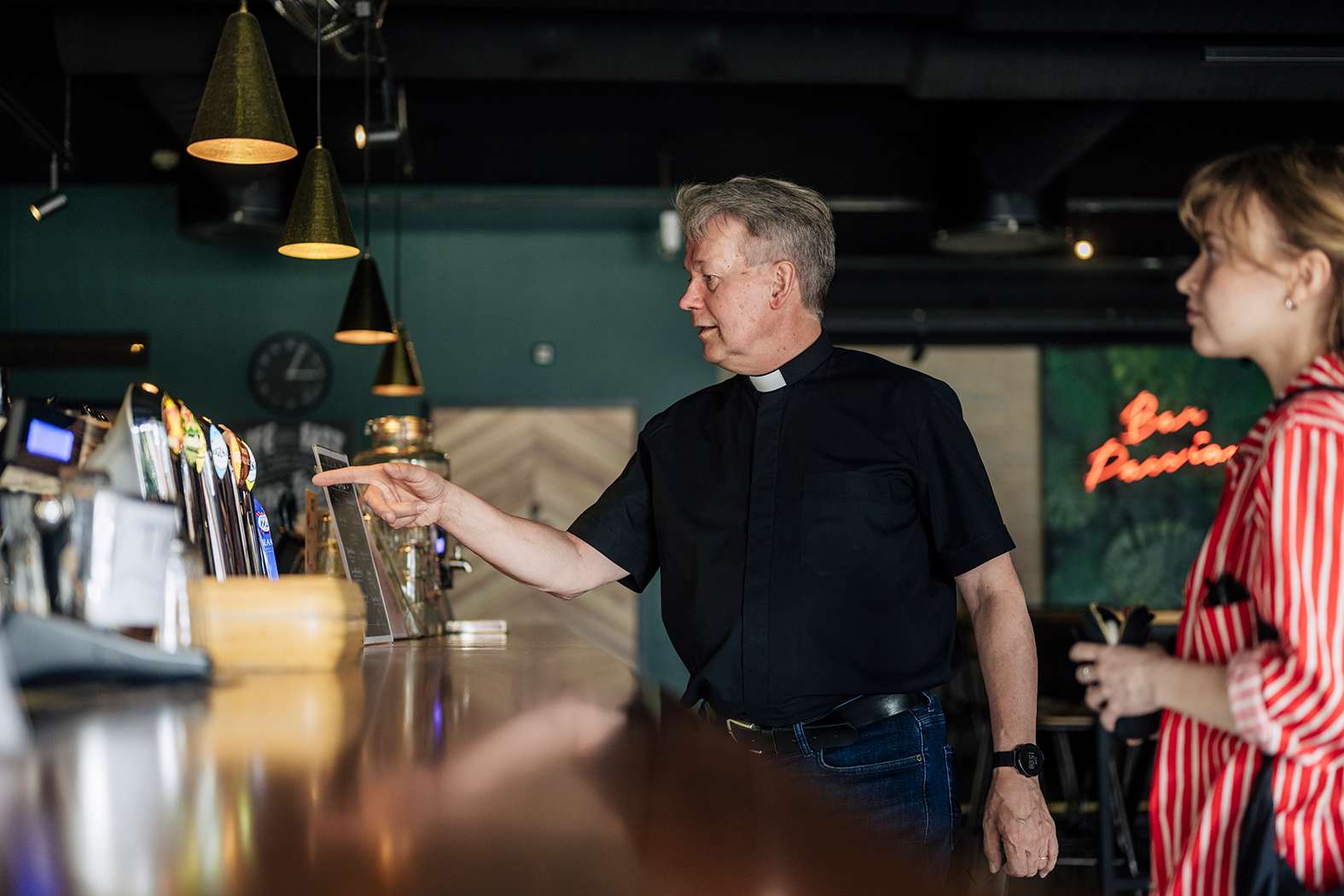
Korhonen studied in the theological faculty of the University of Helsinki in the 1980’s. As minor subjects he studied Finnish and political science.
The student life in 1980’s Helsinki was, according to Korhonen, more relaxed and free than it is today. At that time, the theological faculty of the University of Helsinki was located close to Kaivopuisto on Neitsytpolku. There were lecture and seminar halls, a library and the premises of the theological subject association TYT.
Korhonen reminisces how there were passionate discussions held in the cafeteria’s tables about various theological and topical issues. At the subject association’s office, older students were smoking their pipes and you had to find your way through the smoke.
As for himself, Korhonen describes that he was a polite, normal student.
“I wasn’t any kind of a troublemaker or a drunkard. I always tried to stay in good condition. I helped those who needed it with the mentality of an officer and a gentleman.”
On his career as a student pastor, he has gotten to see changes in student life. Today, it feels that there is more of a hurry and an ethos of accomplishment.
“In the current education system, the ethos starts already in middle school, or at the latest in upper secondary school, where you need to make big decisions by selecting courses. That closes out some opportunities, if you are thinking of an academic path.”
Religion at the university
The relationship between religion and science has been studied relatively little in Finland.
Tampere University had a research project in 2018-2019, where they looked into the religious beliefs of researchers. The project was carried out in Tampere University’s TaSTI research centre.
According to the researchers who were interviewed, religion is a part of the private sphere, and it is largely not talked about at the University. On the other hand, the interviewed researchers felt that it is easier to talk about yoga or eastern religions at the University, but that the local Lutheran traditions are harder to bring up.
Korhonen agrees with the sentiments, at least partially, based on his own experiences.
“The University has surprisingly many outspoken Christians and those who are active in parishes or administrative bodies of the church. In their roles as researchers or teachers, it is certainly wise to primarily work based only on the principles of one’s field of science and professional ethics guidelines.
The pastor feels that religion and science complement one another when you are looking for a wider perspective on the world and what it means to be a human.
“From the Bible’s first pages on, there are creation stories about how the first people were given a task of naming all the plants, animals and natural phenomena. That has been thought of as a kind of a starting point for conducting observational science.”
Not everyone thinks that religion has a place in the activities of public organisations. In the celebrations at the end of spring semesters in primary schools, they might no longer sing the hymn Suvivirsi, and the Finnish National Agency for Education has given guidance on how religious events can take place in schools.
In universities, religion has traditionally been visible in the conferring of doctor’s degrees, which has traditionally included a service. The University of Eastern Finland gave up the tradition of holding services in this context in the summer of 2024. Tampereen vapaa-ajattelijat (the free thinkers of Tampere) proposed in 2022 to give up this tradition in Tampere as well, but the service is still held here.
Korhonen says, that many differing views can be taken into account in the organisation of these services, and they are not exclusionary in spirit. He says he is for the idea of a civilising university
“The European tradition of civilising universities has since the 13th-14th centuries been more or less connected to the church. Academic celebrations, opening ceremonies or the conferring of doctoral degrees has always had some sort of a spiritual aspect. It would be a shame if that were completely lost.”
Martin Luther comes up in the discussion again. Korhonen notes, that Lutheranism is the one of the protestant religions that is principally a university religion, which means a positive attitude towards scientific research, without forgetting the education of the public.
“Luther and his contemporaries were university professors and doctors in theology. They formed the basis for Lutheran and protestant faculties, as well as a strong link to the university spheres of the 16th and 17th centuries.”
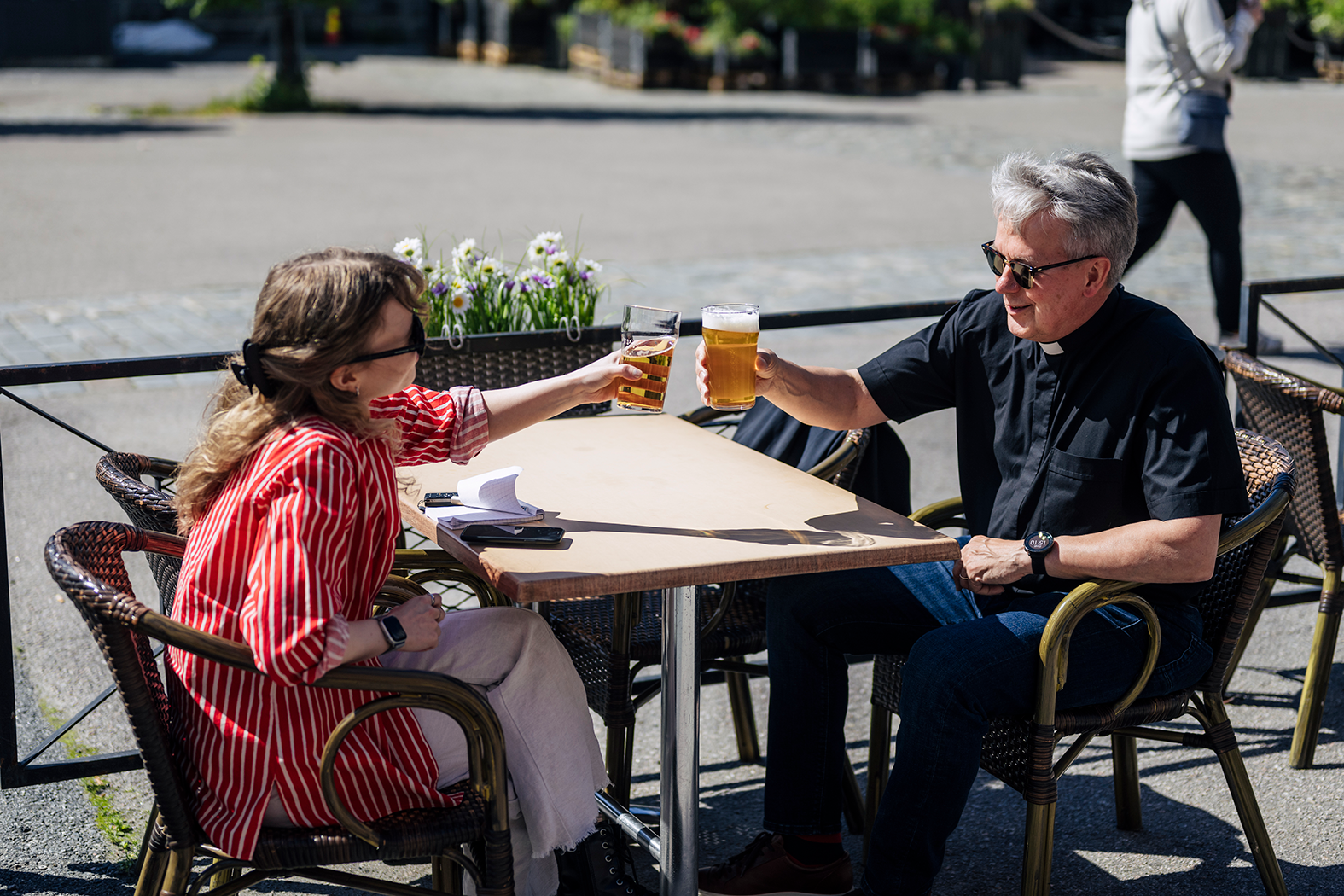
Life balance and spiritual seeking
Tampere University has had a campus pastor since 1960. The fifth floor of the Pinni B building at centre campus holds the Taivaankansi -chapel, built in 2003, as well as Korhonen’s working room. Correspondingly, the campus chapel in Hervanta campus has been in use since the mid-1990’s.
“It’s a part of my professional ethics, that I don’t go into any conversation with a one-sided message about Jesus.”
Typically, students come to Korhonen to talk about growing pains relating to becoming an independent adult. Common themes are the balancing of studies, life and relationships. Many students and young adults feel lonely, which is visible in the discussions that Korhonen has.
The motivation to approach the campus pastor is today less about spiritual seeking or questions about Christianity, Korhonen explains. That might still be in the background, but Korhonen says that his role is more often that of a trusted expert.
“It’s a part of my professional ethics, that I don’t go into any conversation with a one-sided message about Jesus. The agenda is always set by the other side, and I gladly join it. If spiritual or religious questions come up in the discussion, then I’ll be happy to contemplate them together on the same level with the conversation partner.”
Together with his colleagues, Korhonen tries to put out the message that their services are confidential and free, and are based on the principles equality and hospitality. He says that it doesn’t matter, whether someone is a member of a particular church, or if they have a critical view of the Church.
The Church is not exactly the most agile of organisations. Even Korhonen admits that decision-making in the church proceeds very slowly.
The Evengalical Lutheran Church of Finland has a special status in Finnish legislation. Only the Church can make changes to the Church Code, through the General Synod. The parliament can only accept or dismiss the proposed changes to the Church Code, along with making technical corrections to them.
One of the slow-moving issues that divides the Church is the issue of equal marriage rights. According to the Church Code in force today, accepting it would require a five-sixths majority.
Korhonen says that, from his own small part, he has tried to promote equality in the issue of marriage.
“I hope that in the 2030’s, the Evangelical Lutheran Church of Finland has solved the marriage question in a way that is consistent with the official Finnish legislation at the time.
QUICK QUESTIONS FOR THE PASTOR
Do you often think “what would Jesus do?”
“As a matter of fact, quite rarely. That question comes from American evangelical Christianity, which is a bit of a foreign type of Christianity to me.
Today, Jesus would do what the gospel says: spread the word to the poor, promise amnesty to the prisoners and give vision to the blind. He would set the subjugated people free and declare the Lord’s message.”
Do you know the Bible by heart?
“No. An old advice to priests and theologians is that the Bible isn’t something to be learnt by heart, but it’s wise to learn what it contains.”
Favourite Bible quote?
“God is love. This is how God showed his love among us: He sent his one and only Son into the world that we might live through him.” ( The First Epistle of John 4:8-9 )
God visits bar Passion
We’re halfway through out drinks. I ask the pastor about what belief means to him. Korhonen thinks about it for a long time, and finally condenses his answer into three points.
“I feel that I am perfectly loved, perfectly accepted and perfectly trusted.”
In Finnish culture, talking about religion feels personal, even if you are talking with a professional. Korhonen says that discretion is perhaps built into the Finnish identity.
“I want to respect the other party, in this case you, by not hammering you on the head with the Bible.”
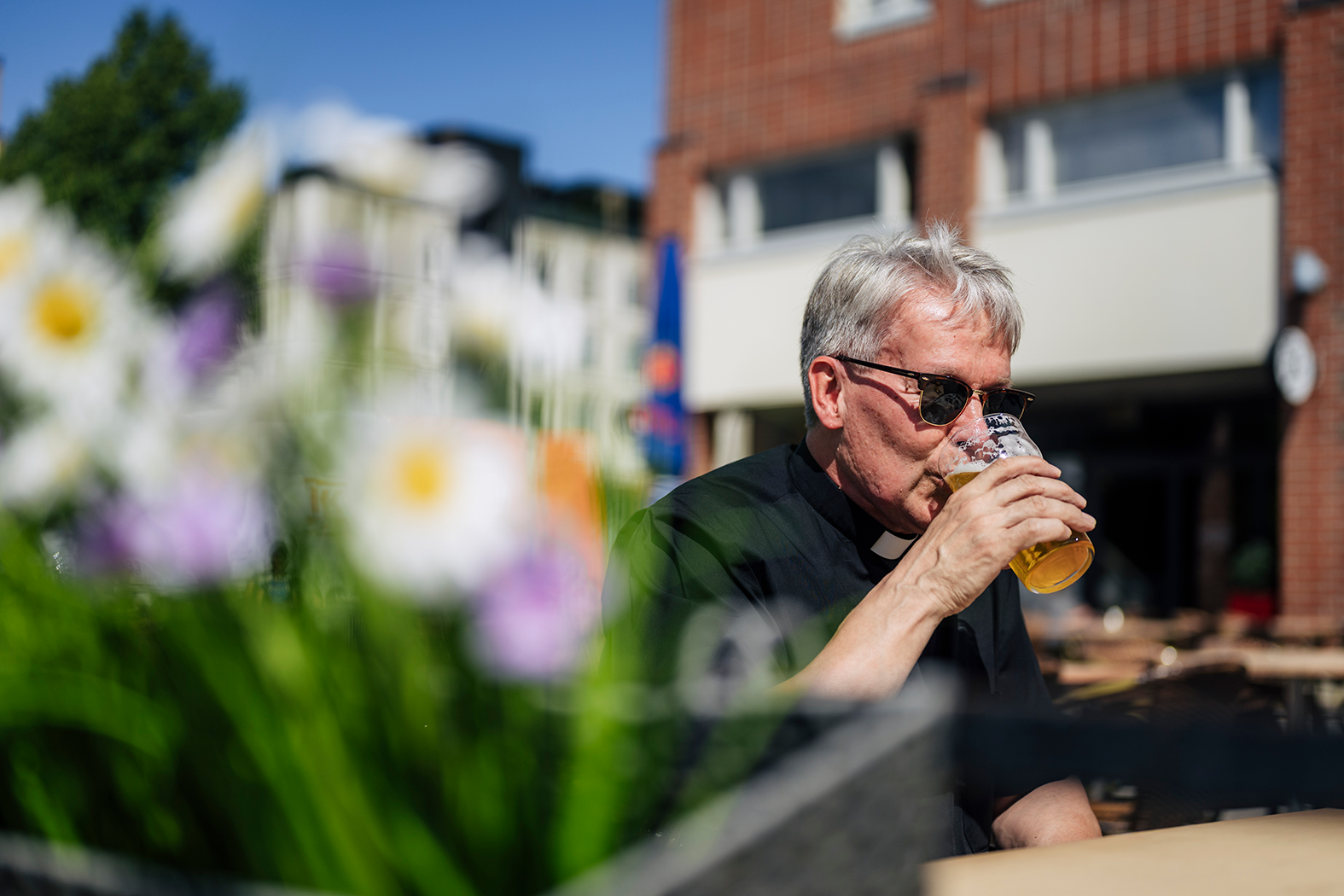
He refers to Martin Luther once more. According to the reformer, it is not possible for people to put God into a small box within their lives. Korhonen describes how being a human and living in the world means that at the same time you are living in God’s world.
“He is present here, between us. Sometimes His presence is perhaps easier to be sensed and felt in a concrete way.”
When can you feel the concrete presence of God?
“At some points during this conversation, for example, we are on the same wavelength for a fleeting moment. At that point, I think, some channel has opened.”
I can’t comment as to whether God was present in bar Passion on a regular Tuesday evening. The sun is shining, the seagulls are screeching and trams are rattling by.
The drinks are soon finished.
A New phase in life
Kimmo Nieminen was chosen as the follower for Korhonen in early June.Earlier, he has worked as the university priest in the University of Jyväskylä.
The new pastor will start in the beginning of September, and Korhonen will familiarise him with the work. After that, there will be a large amount of unkept vacations, trips abroad and a process of entering a new phase in life.
“When the final retirement starts in early February 2025, by then I will probably have found some nice social activities.”
He’s still hopeful about getting a place in a good choir in Tampere. His voice is a baritone.
“At some point in the early morning hours, a joyful group of students dressed in coveralls came to ask if they can try this on. I said yes, you can try it.”
In addition to music and sports, Korhonen is interested in long pilgrimages in Finland as well as elsewhere in Europe. So far, he has made three long voyages that ended in Santiago de Compostela in Spain.
If my wife gives me the permission and my financial as well as physical condition allows it, then next year I hope to walk a route that ends in Rome.
Korhonen thinks long about how he would condense his greeting to Tampere University community. He doesn’t want to give platitudes.
He gives thanks to those diverse members of the university community that he has met, and who have given him many kinds of memories. One of those memories is a Vappu party in the nightclub of Ilves.
“At some point in the early morning hours, a joyful group of students dressed in coveralls came to ask if they can try this on. I said yes, you can try it.”
“This” is the white collar of his shirt that identifies him as a priest. Korhonen’s uniform has gathered some curious looks in the bar, which we are soon leaving.
As a conclusion, he raises three further points.
“Let’s behave ourselves, take care of others, and there is a God, even if you don’t believe it.”
When we have already left the bar at the end of the interview, Korhonen runs back to us give the photographer a coverall patch of the university chapel. By coincidence, it fits the theme of the interview.
The patch is an imitation of the Lapin Kulta -beer logo, but it reads “Papin Kulta” (a pun, roughly translating to “The Priest’s dear”).
RISTO KORHONEN
» Born in 1958, turning 66 in October.
» Graduated from the theological faculty in the University of Helsinki in 1990.
» Campus pastor in Tampere University since 1996, retiring in early 2025.
» His family consists of a wife and two daughters.
